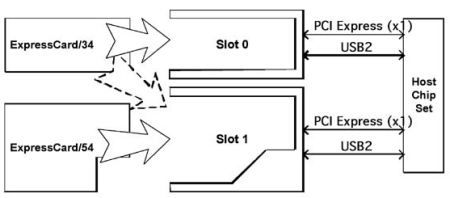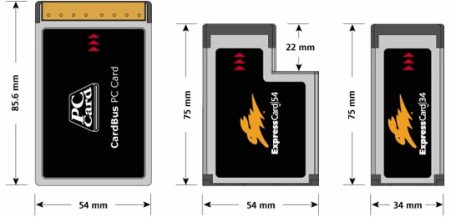Next-gen PCMCIA: “thinner, faster, lighter”
Sep 22, 2003 — by LinuxDevices Staff — from the LinuxDevices Archive — views The PCMCIA trade association rolled out version 1.0 of its next-generation standard for modular mobile and desktop computer expansion at this week's Intel Developer Forum in San Jose, CA. Dubbed “ExpressCard”, the new standard is “thinner, lighter, faster” than the group's previous PC Card standards, according to PCMCIA chairman Brad… Saunders.
The PCMCIA trade association rolled out version 1.0 of its next-generation standard for modular mobile and desktop computer expansion at this week's Intel Developer Forum in San Jose, CA. Dubbed “ExpressCard”, the new standard is “thinner, lighter, faster” than the group's previous PC Card standards, according to PCMCIA chairman Brad… Saunders.
ExpressCard achieves its space reduction by replacing the legacy parallel buses of the first and second generation PCMCIA card standards with state-of-the-art, high-speed serial connections, following a trend common in current computer system design.
To avoid reinventing the wheel, the developers of ExpressCard leveraged two existing (but relatively new) serial buses: PCI Express and USB 2.0. And since both of these buses are already present in many new mobile and desktop PC chipsets, the biggest challenges to adding ExpressCard to new system designs are likely to be mechanical ones.

Two sizes of ExpressCard modules are defined — 54mm and 34mm wide — as shown in the photo below. Both module versions are 75mm long and 5mm thick. The following figure compares the two ExpressCard module sizes (middle and right) to the original PC Card size (left).

“Smaller modules take up less space in the system, but there are also some applications which have a physical requirement for the wider module, such as CompactFlash card readers, security card readers, and 1.8-inch rotating media,” said Saunders.
What's in a name?
ExpressCard is the latest in a series of card standards from the PCMCIA organization. The original memory-only standard was called, simply, “PCMCIA” (the organization's name stands for “Personal Computer Memory Card Industry Association”). The PCMCIA standard was soon revised to add input/output (I/O) interface capabilities, enabling the implementation of modem, networking, wireless, and many other non-memory functions on PCMCIA cards. At that point, the cards became known as “Release 2 PCMCIA cards”. Shortly later, the designation “PC Cards” was adopted, in an effort to transcend the implication that the cards were primarily for memory purposes (as implied by the “M” in PCMCIA).
Later, the ISA bus (the pre-PCI card-edge bus used to add expansion cards to older PCs) of the original PC Cards was replaced with the faster and wider PCI bus, and those cards were designated “CardBus”.
ExpressCard technology is expected to eventually replace CardBus as the modular expansion solution for both mobile and desktop systems, the group says.
Photos courtesy of PCMCIA; used with permission.
This article was originally published on LinuxDevices.com and has been donated to the open source community by QuinStreet Inc. Please visit LinuxToday.com for up-to-date news and articles about Linux and open source.